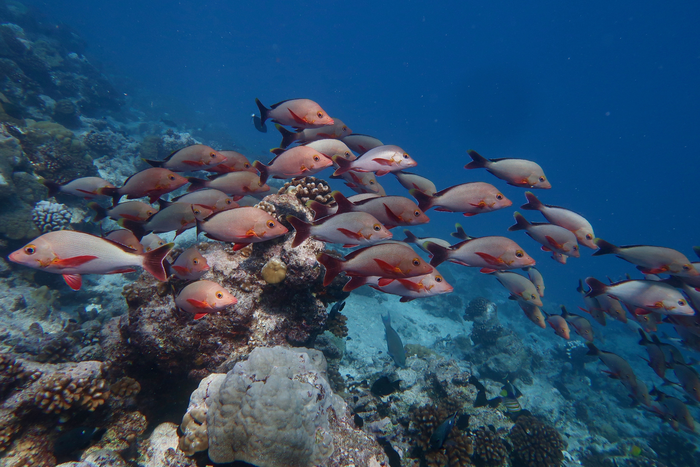Coral reefs all over the world, already threatened by rising temperatures brought about by climate change, also face serious challenges from the possibility of fish species extinctions. According to a paper out today in the Proceedings of the National Academy of Sciences, the networks of predator fish and their prey found on coral reefs all over the world are remarkably similar, and those predator fish are pickier eaters than previously thought. These delicate ecosystems become even more vulnerable when these specialized hunters go extinct.

Credit: Jordan Casey, University of Texas at Austin
Coral reefs all over the world, already threatened by rising temperatures brought about by climate change, also face serious challenges from the possibility of fish species extinctions. According to a paper out today in the Proceedings of the National Academy of Sciences, the networks of predator fish and their prey found on coral reefs all over the world are remarkably similar, and those predator fish are pickier eaters than previously thought. These delicate ecosystems become even more vulnerable when these specialized hunters go extinct.
Coral reefs are some of the most diverse ecosystems on Earth, providing critical habitat for thousands of species that sustain economies and provide for the diets and livelihoods of millions of people. In the largest and most comprehensive study of its kind, researchers from France and The University of Texas at Austin concluded that coral reef food webs are more delicate than previously thought. Researchers made the conclusion after synthesizing the stomach contents of most fish species found on six coral reef systems around the world.
The team revealed that the vast majority of reef fish species are very picky about what they eat, rather than opportunistically feeding on anything they could find. Although reefs will probably withstand the loss of several prey species, the loss of a single larger fish species may jeopardize the ecosystem.
“It’s remarkable that we see similar patterns in coral reef systems all over the world. Extinctions, particularly of larger fish species, may have significant impacts for coral reef systems,” said Jordan Casey, an assistant professor of marine science at UT Austin’s Marine Science Institute (UTMSI) and an author on the paper.
Many conditions can cause the local loss of fish species, such as climate change, commercial fishing and pollution. Such fish declines may leave an increasing number of prey uneaten, creating imbalances in the food web.
“Reefs rely on the efficient utilization of all creatures,” said Simon Brandl, also an author and an assistant professor at UTMSI. “If a fish specializes on eating a certain type of snail and that fish disappears, the snail might not be eaten and live happily ever after. This creates a dead end for the food it could provide to other coral reef creatures. Good news for the snail. Bad news for everything else living there.”
The study examined the feeding habits of more than 600 species found on six different coral reefs near Okinawa, Hawaii, the West Indies, New Caledonia, Madagascar and the Marshall Islands. Despite regional differences, the food webs had a strikingly similar structure: 67% of species were specialized feeders with strong preferences for specific prey items, despite the tremendous diversity of available food on coral reefs.
“Coral reefs are important to humans for a number of reasons,” Casey said. “They are a critical source of food for many people. They are also popular tourist destinations and economic engines for a number of countries. However, coral reefs can only provide these key ecosystem services if food webs remain intact.”
###
Chloé Pozas-Schacre of the École Pratique des Hautes Études led the study. Other authors include Michel Kulbicki of Université de Perpignan, Mireille Harmelin-Vivien of Aix-Marseille Universite, Giovanni Strona of University of Helsinki and Valeriano Parravicini of the École Pratique des Hautes Études. The research was funded by the BNP Paribas Foundation, the French National Agency for Research, a Make Our Planet Great Again Postdoctoral Grant, the European FEDER Fund, the Foundation for Research on Biodiversity and the Agence Nationale de la Biodiversité.
Journal
Proceedings of the National Academy of Sciences
DOI
10.1073/pnas.2100966118
Subject of Research
Not applicable
Article Title
Congruent trophic pathways underpin global coral reef food webs




